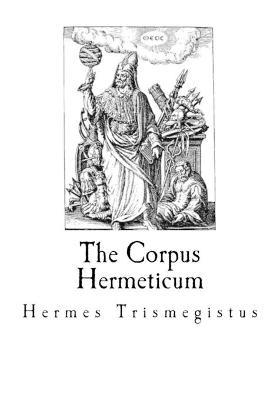The Corpus Hermeticum

The Corpus Hermeticum
The Corpus Hermeticum
Hermes Trismegistus
Translated by G.R.S. Mead The Hermetica are Egyptian-Greek wisdom texts from the 2nd and 3rd centuries AD, which are mostly presented as dialogues in which a teacher, generally identified as Hermes Trismegistus ("thrice-greatest Hermes"), enlightens a disciple. The texts form the basis of Hermeticism. They discuss the divine, the cosmos, mind, and nature. Some touch upon alchemy, astrology, and related concepts.The fifteen tractates of the Corpus Hermeticum, along with the Perfect Sermon or Asclepius, are the foundation documents of the Hermetic tradition. Written by unknown authors in Egypt sometime before the end of the third century C.E., they were part of a once substantial literature attributed to the mythic figure of Hermes Trismegistus, a Hellenistic fusion of the Greek god Hermes and the Egyptian god Thoth. This literature came out of the same religious and philosophical ferment that produced Neoplatonism, Christianity, and the diverse collection of teachings usually lumped together under the label "Gnosticism" a ferment which had its roots in the impact of Platonic thought on the older traditions of the Hellenized East. There are obvious connections and common themes linking each of these traditions, although each had its own answer to the major questions of the time. The treatises we now call the Corpus Hermeticum were collected into a single volume in Byzantine times, and a copy of this volume survived to come into the hands of Lorenzo de Medici's agents in the fifteenth century. Marsilio Ficino, the head of the Florentine Academy, was pulled off the task of translating the dialogues of Plato in order to put the Corpus Hermeticum into Latin first. His translation saw print in 1463, and was reprinted at least twenty-two times over the next century and a half.
PRP: 77.11 Lei
Acesta este Pretul Recomandat de Producator. Pretul de vanzare al produsului este afisat mai jos.
69.40Lei
69.40Lei
77.11 LeiLivrare in 2-4 saptamani
Descrierea produsului
The Corpus Hermeticum
Hermes Trismegistus
Translated by G.R.S. Mead The Hermetica are Egyptian-Greek wisdom texts from the 2nd and 3rd centuries AD, which are mostly presented as dialogues in which a teacher, generally identified as Hermes Trismegistus ("thrice-greatest Hermes"), enlightens a disciple. The texts form the basis of Hermeticism. They discuss the divine, the cosmos, mind, and nature. Some touch upon alchemy, astrology, and related concepts.The fifteen tractates of the Corpus Hermeticum, along with the Perfect Sermon or Asclepius, are the foundation documents of the Hermetic tradition. Written by unknown authors in Egypt sometime before the end of the third century C.E., they were part of a once substantial literature attributed to the mythic figure of Hermes Trismegistus, a Hellenistic fusion of the Greek god Hermes and the Egyptian god Thoth. This literature came out of the same religious and philosophical ferment that produced Neoplatonism, Christianity, and the diverse collection of teachings usually lumped together under the label "Gnosticism" a ferment which had its roots in the impact of Platonic thought on the older traditions of the Hellenized East. There are obvious connections and common themes linking each of these traditions, although each had its own answer to the major questions of the time. The treatises we now call the Corpus Hermeticum were collected into a single volume in Byzantine times, and a copy of this volume survived to come into the hands of Lorenzo de Medici's agents in the fifteenth century. Marsilio Ficino, the head of the Florentine Academy, was pulled off the task of translating the dialogues of Plato in order to put the Corpus Hermeticum into Latin first. His translation saw print in 1463, and was reprinted at least twenty-two times over the next century and a half.
Detaliile produsului








